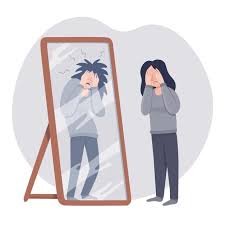Self-esteem issues can have a significant impact on an individual's mental health and overall well-being. These issues often manifest as feelings of inadequacy, low self-worth, and a negative self-image. They can manifest in a variety of ways, including depression, anxiety, and difficulty in personal and professional relationships.
There are many potential causes of self-esteem issues. These can include a lack of positive feedback or validation from others, traumatic experiences, or feelings of disappointment or failure. Additionally, some individuals may have a genetic predisposition to self-esteem issues, or may have been raised in an environment that did not foster positive self-worth.
Treatment for self-esteem issues typically involves therapy or counseling. A trained mental health professional, such as a psychiatrist, can help individuals identify and work through the underlying causes of their self-esteem issues. They can also teach coping mechanisms and strategies to improve self-worth.
Cognitive Behavioral Therapy (CBT) is one of the most common forms of therapy used to treat self-esteem issues. This type of therapy focuses on identifying and changing negative thought patterns and beliefs that contribute to low self-esteem. Through CBT, individuals learn to challenge and reframe negative thoughts, and replace them with more positive and realistic ones.
Another type of therapy that can be used to treat self-esteem issues is called Interpersonal Therapy (IPT). This type of therapy focuses on the individual's relationships with others, and how these relationships may be contributing to their self-esteem issues. IPT can help individuals develop better communication skills and improve their relationships with others.
Medication may also be used as an adjunct treatment for self-esteem issues. Antidepressants, such as selective serotonin reuptake inhibitors (SSRIs), can help improve mood and reduce symptoms of depression. However, it's important to note that medication should always be used in conjunction with therapy, as medication alone is not typically considered an effective treatment for self-esteem issues.
It's important to seek treatment for self-esteem issues as soon as possible. Left untreated, self-esteem issues can lead to a wide range of negative outcomes, including depression, anxiety, and difficulty in personal and professional relationships. Furthermore, seeking treatment early on can make the healing process quicker and more effective.
A psychiatric service can be a great place to start for self-esteem issues treatment. A psychiatric professional can help you identify the underlying causes of your self-esteem issues and provide you with the appropriate treatment. Don't hesitate to reach out for help, it can be a life-changing decision that will bring positive results in the long run.

